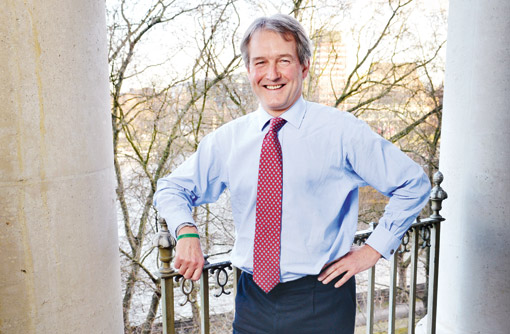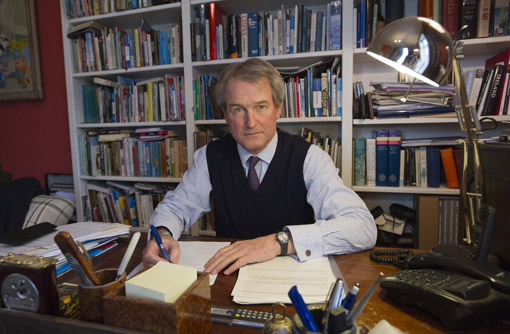Owen Paterson spells out his vision for DEFRA

DEFRA secretary Owen Paterson has wasted no time tackling the issues that really matter to farmers, such as bovine TB, the rural economy and agri-science. He tells Philip Case his plans for 2013
What will be the key issues in farming in 2013?
In 2013, I think the long-term trends will continue, which is to produce food of a good quality, based on good raw materials, which is traceable and competes in the world market. DEFRA’s role is very much to help farmers do that.
On the end product, I see a role for DEFRA in helping exporting. I led a delegation to the largest Chinese food exhibition in Shanghai and I will certainly be carrying on that work with real enthusiasm in 2013. We are going to be holding a dairy export summit in the new year and will pull together all the exporters who went to China.
I can also see huge potential for us in developing our agri-science industry and working closely with those involved, and opening up opportunities.
How sure are you that a trial badger cull will go ahead in summer 2013?
We have to do these trials to see how we can most efficiently and humanely remove diseases from wildlife. I have seen first-hand how they addressed the problem of TB in white tail deer in Michigan, USA. In New Zealand, they use the tuberculin test in cattle and they bear down on the disease in possum. They reduced the number of cases from 17,000 herds to fewer than 100. The four counties trial in the Republic of Ireland saw a 96% reduction in bovine TB in Donegal. Farmers in Burgundy, France, have a daily cull of badgers, foxes and wild boar that have TB. You cannot get rid of TB, which is a horrible disease for animals, unless you bear down on wildlife and cattle – and that’s what we intend to do.
What are you doing to ensure a cattle vaccine is ready as soon as possible?
If I had a button I could press that said “vaccinate”, I’d press it. The reality is that we don’t. The vaccine is not yet ready. The test to differentiate between vaccinated and unvaccinated cattle is not ready. We have to adhere to World Organisation for Animal Health (OIE) rules, which bind the European Commission. We are putting £15.5m into a vaccine and all this needs pursuing. The immediate tool available is culling to bear down on the disease in wildlife.
“If I had a button I could press that said “vaccinate”, I’d press it. The reality is that we don’t. The vaccine is not yet ready.”
Owen Paterson
What provision have you made to combat bovine TB should a cull not go ahead – is there a plan B?
A third parallel route is polymerase chain reaction (PCR) analysis to see if we could be more targeted. That’s well worth pursuing. I will have to use the tools at my disposal at the moment. But I am very much looking to the future, to see which tools could work in a different way. We have a hideous problem now; 26,000 cattle went to slaughter last year, which were perfectly healthy. We’re heading to a cost of £1bn. We simply cannot afford to go on like this.
Do you have support in Brussels to push through EU legislation on cattle vaccine?
The discussions are bound by international rules set by the OIE. You cannot have trade in cattle that may be diseased which you can’t identify. We are talking to the European Commission. There has been a change of commissioner, which has caused slight disruption. But I visit Brussels every month and we will be pursuing this hard.
February will mark one year since the government’s response to the Macdonald report, aimed at reducing the amount of red tape in farming. One year on, how many of the Macdonald recommendations that DEFRA said it would implement, have been fully implemented, how many partially implemented and how many not implemented at all?
I have just had a meeting with Richard Macdonald and I made it absolutely clear that this is a real priority. In fairness, Jim Paice started the ball rolling. He was absolutely right. I have never been on a farm without someone complaining about some type of form-filling. Richard Macdonald reckons we have reduced the number of farm visits by 12,000 per year, which is a significant move. There were 137 recommendations – many of which are now put into practice. But there is still more to be done.
I intend to work very closely with him throughout 2013 to ensure we can get those recommendations implemented. The more we can leave responsible farmers to get on and run their own show, unhindered by visits and time-consuming paperwork, the better.
How has your thinking progressed on wind farms and anaerobic digestion since you started as DEFRA secretary?
It should be horses for courses. There is intense opposition to wind turbines in inland rural areas where there is insufficient wind.
The source I’m most interested in is anaerobic digestion. It’s amazing that we throw away 15m tonnes of food a year. I think there are real opportunities to turn that waste into energy. There is a real opportunity to use more farm slurry. I am also interested in looking at the possibility of converting slurry tanks.
“The more we can leave responsible farmers to get on and run their own show, unhindered by visits and time-consuming paperwork, the better.”
Owen Paterson
What impact will a reduced EU budget have on UK farmers?
The logical progression through MacSharry to Fischler is that ultimately decisions on food production – what crops you grow, what animals you raise – should be left to the market.
The main taxpayer function should be compensating farmers for the environmental benefits for work on improving their land or providing a public good for which there is no obvious market mechanism. I think that will carry on. I would like to see that as the logical conclusion of these discussions [on CAP reform].

Peter Kendall voiced concern that the Treasury has too much influence over the UK stance on CAP reform – How do you respond to that?
We have to respect the hideous deficit we have inherited, which is proving incredibly intractable and difficult to get rid of. We are still borrowing very significant sums of money and spending £120m a day on debt interest.
All departments of government have to be prudent with public money when we are borrowing at the levels we are.
How will you ensure that a reformed CAP meets the needs of the whole of the UK and answers the specific needs of the devolved regions?
We are very careful to keep close contact with the devolved ministers. They tend to come along when we are in council. We agree lines to take. At the last council meeting in November, I was very specific – both in the council itself and in private meetings – to make key points which are of real relevance to the regions.
We want national and regional flexibility. We come from different political backgrounds and don’t agree on absolutely everything. Recently, the devolved ministers’ parties voted for a bigger cut in the EU budget than the government did in the House of Commons.
